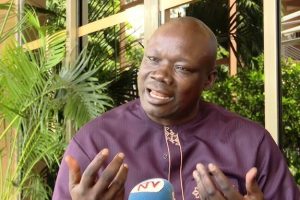The Uganda Police have warned the public to ignore threats and calls from scaremongers to protest over skyrocketing food and fuel prices in the country. The police warning comes at a backdrop of video and audio clips making rounds on social media where a group of yet-to-identified individuals appeared warning the public to stay home starting tomorrow Monday, July 25, to Wednesday, July, 27 as there will be protests over high prices on fuel and other essential commodities.
However, in a statement issued on Sunday morning, Police spokesperson, Mr Fred Enanga said security is aware of the individuals behind the messages aimed at promoting hate, panic and fear, among Ugandans and visitors in the country.

The Joint Security Agencies are aware of individuals and groups, from within the country and abroad, that are promoting hate, panic, and fear, among Ugandans and visitors in the country, through videos, audio and text messages of malicious propaganda, instructing all members of the public to stay in their homes for 3 days, from the 25th to the 27th of July, 2022, as part of their alleged campaign against inflation in the country,” Enanga’s statement reads in part.
Enanga explains that in the clips which are currently being investigated by police, “the authors of the recordings in an aggressive tone, further issue threats of attack to persons, who are against their stay-at-home orders. After the 3 days, they claim their alleged protests will transition, into open street demonstrations and mass uprisings, to purposely cause change in government. These are illegitimate and unconstitutional means that we do strongly condemn.”

According to the police spokesperson, these are similar messages sent out in the aftermath of the 2021 general election in which members of the public were asked to protest against the outcome of the presidential election in which NRM’s Yoweri Museveni was declared winner to beat NUP’s Robert Kyagulanyi, his closest rival.
“For those who can remember, similar scare tactics were used by the same individuals and political groups, in February 2021, in the aftermath of the General Elections. However, their ill-intentioned plans were rejected by the public, after realizing that the authors and organizers, were rallying support for street violence and civil uprisings, for their selfish political advantages,” he said.
Enanga said unlike previously where planners hinged their protests on the outcome of the election to rally the public for “street violence and civil uprisings”, “this time, they are using the surge in commodity and fuel prices to call for violence.”
“Many countries, including the most developed countries, are also grappling with inflation as they strive to return to normalcy. We, therefore, urge all Ugandans and visitors in the country, not to get swayed by the fear tactics, mongering and inflammatory rhetoric, by the selected individuals, political groups, and sponsored bloggers. They should instead look for better ways of expressing their dissatisfaction with the economy, without fronting violence.”
“As the joint security agencies, we want to reassure all Ugandans and visitors in the country, that we remain steadfast and committed, to protecting the lives and properties of each and every one. Our task teams are ready to prevent, deter, stop and prosecute all perpetrators behind these scare tactics, aimed at causing violence and civil uprisings.”
In his address to the country on Wednesday, President Museveni offered no short term solutions to the problem of skyrocketing prices caused by the high fuel prices.
Whereas a number of countries have provided subsidies, Museveni insisted that treading this line would be suicidal since it would make people feel comfortable when they are not.
“When you subsidise, you mislead people to think that there is plenty and they fail to economise what they have, in the long run, you deplete your reserves. This pressure to use the little money we have to subsidise problems, we would rather use it to get out of problems that we have. That will make people feel comfortable when they are not,” Museveni said.
“If you subsidize or cut taxes, you mislead people. They get used and stop living within their means and in the end you may transform high prices into total shortage. There is a difference between high prices and a shortage of commodities, so which is better? In this situation, the biggest challenge is that we can no longer have plenty. Taxes are meant for development. We want to build new roads and other projects and when we cut taxes or subsidize commodities, the projects are stopped and money is taken for eating and buying fuel to drive cars.”
![]()




